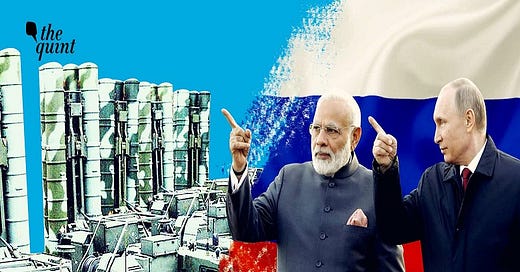America Will Never Impede The Military Dimension Of The Russian-Indian Strategic Partnership
The US is no longer able to impose its will onto others like it did during the climax of the brief unipolar moment immediately after the end of the Old Cold War because rising multipolar Great Powers like India refuse to unilaterally concede on issues that they regard as being in their objective national interests.
Russian Ambassador to India Denis Alipov told the Press Trust of India that the military dimension of these two Great Powers’ strategic partnership remains solid in spite of malicious attempts to impede it. In his words, “Defence cooperation is one of the major pillars of the Russian-Indian special and privileged strategic partnership. Both our nations are very motivated to ensure that it remains uninterrupted. We managed to successfully mitigate barriers created by negative external factors and adjust to new realities using alternative payments and logistics options.”
President Putin earlier explained the role of Russia’s military diplomacy in strengthening multipolarity, which in the context of the special and privileged Russian-Indian Strategic Partnership relates to maintaining the balance of power in Delhi’s geo-pivotal region of Eurasia. South Asia sits in the center of the Eastern Hemisphere where all processes connected with the global systemic transition to multipolarity are converging, so it’s of the highest importance for Moscow to ensure that everything remains stable there.
State Department spokesman Ned Price recently reaffirmed his declining unipolar hegemon’s intention to continue meddling in Indian foreign policy, yet Ambassador Alipov reassured everyone that it’s bound to fail in the military dimension exactly as Foreign Minister Sergey Lavrov just said that it already had when it comes to the economic one. Building upon His Excellency’s insight, the alternative payments options that he was referring to are likely those associated with the de-dollarization mechanism that India just pioneered for maintaining bilateral trade with Russia.
The logistics ones, meanwhile, could either mean that prior sea-based routes are still being employed or might also imply that military equipment is being sent via their shared Iranian partner with whom those two aspire to jointly create a third pole of influence in the present bi-multipolar intermediary phase of the global systemic transition to more complex multipolarity (“multiplexity”). Additionally, it deserves to be mentioned that the likelihood of the US granting a sanctions waiver for India’s purchase of Russia’s S-400 air defense systems is indeed a sign of weakness like Moscow’s military-industrial chief claimed.
The US is no longer able to impose its will onto others like it did during the climax of the brief unipolar moment immediately after the end of the Old Cold War because rising multipolar Great Powers like India refuse to unilaterally concede on issues that they regard as being in their objective national interests. Moscow is Delhi’s top military partner anywhere in the world and Russian equipment enables India to maintain credible deterrence vis a vis neighboring China and Pakistan, which the Kremlin regards as upholding peace and stability in that geostrategic part of Eurasia.
Under no circumstances will India ever comply with a foreign power’s demands that essentially amount to endangering its national security by voluntarily depriving itself of the ability to defend itself. The US’ incessant Hybrid War pressure on India to this end risks spoiling the hitherto mutually beneficial strategic relations that those two worked so hard to develop over the past decade, yet this trend isn’t expected to end anytime soon since American strategists have decided to double down on this counterproductive policy since they still refuse to respect India as an equal partner.




